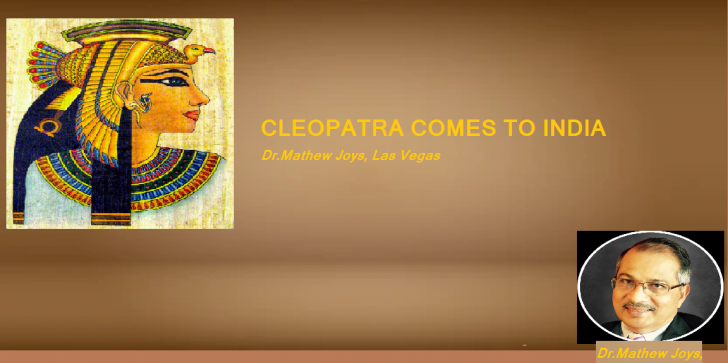Articles features
Cleopatra Comes to India

Not everyone thinks Cleopatra was so beautiful, But that's how Julius Caesar said.
Cleopatra's name is still remembered amongst so many other crucial things. Now BJP leader and former Union Minister Maneka Gandhi said that soap made from donkey milk would enhance the beauty of women. Menaka's remarks were made in a speech delivered in Baldira, Uttar Pradesh.
About 46 years ago, I read the masterpiece of the English drama, one of Shakespeare's most tragic and love stories, Antony and Cleopatra. Truly, I could understand only less than fifty percent of its conversations. I understood much of Cleopatra's wielding immense political power through her sexuality. I understood the rest of the story later watching the movie Cleopatra. This epic saga of romance, greed and betrayal was starred by Elizabeth Taylor, as the seductive Egyptian Queen who was determined to cling on to the throne, and seduce the Roman Emperor Julius Caesar (Rex Harrison). When Caesar was murdered, Cleopatra turned her affinity to his general Mark Antony (Richard Burton) immediately.
Cleopatra used to bathe in donkey's milk, says Menaka in a speech that has gone viral on social media. Soap made from donkey’s milk costs Rs 500 in Delhi. Menaka asked why we didn't start making donkey and goat milk soap. So let us think about the Queen of Denial with Menakaji.
Cleopatra was throned at the age of 17, and she died after 22 years. She spoke nine languages. She also knew to read Egypt's hieroglyphics and unique writing in Egypt. She also knew Greek and most of the languages ​​in the Mediterranean region, including Hebrews and Arabs.
With this vast knowledge, the world encyclopedia was open wide to her.
Apart from languages, she mastered alchemy, medicine, zoology, economics, geography, history, astronomy, international diplomacy, mathematics, and many other disciplines to access all the knowledge of her time up to date.
Not that much alone.
Cleopatra spent much of her time in a special type of ancient laboratory. She wrote some findings related to herbs and beauty products. Unfortunately, all her books were destroyed in the fire of the great Library of Alexandria in 391 AD. The famous physicist Galen really had a chance to study her research work and could transcribe many of the recipes devised by Cleopatra. A special cream that could help bald men re-grow their hair was a notable one. Galen also recommended remedies that included beauty tips, but none came to the open world.
The queen of Egypt was a genius who was also interested in herbal healing. Thanks to her knowledge of languages, she had access to numerous papyri that are lost today. Her influence on the sciences and medicine was well-known in the early centuries of Christianity. It is believed that Cleopatra killed herself by allowing an Egyptian Cobra to bite her. Still, for the Roman-era writers Strabo, Plutarch, and Cassius Dio affirmed that Cleopatra poisoned herself using either a toxic ointment or by introducing the poison with a sharp implement such as a needle.
Cleopatra's death has evoked themes of eroticism and sexuality in works that include paintings, plays, and films, especially from the Victorian era. Modern works depicting Cleopatra's death include Orientalist painting, Neoclassical sculpture and cinema. Wax statue of Cleopatra on display at Tussaud's London Wax Museum is a popular attraction.
And now Menakaji at least remembered the beauty Queen Cleopatra when she remembered donkey’s milk, nothing political!
I still don't know whether Cleopatra bathed in donkey's milk, but surely, that name will fetch good market if a soap comes out with that ingredient.
Though so much funny stories roam around, without a doubt, Cleopatra is a unique figure in the history of humanity. Thanks Menakaji for reminding the legend and beauty Queen Cleopatra to live in Indian History in the future soap days.

3 hours ago
Judge Juli Mathew Prepares for Third Term Bid; A Proud Moment for Malayali Community

4 hours ago
Former US Vice President Dick Cheney passes away at 84

6 hours ago
Canada's crackdown on student visas hits Indian applicants hard

6 hours ago
India and US focus on bolstering defence ties during Military Cooperation Group meeting in Hawaii

9 hours ago
USCIS Enhances Voter Verification Systems

9 hours ago
HAF staff members honored with “Pursuer of Peace” awards by Jewish community group StandWithUs

10 hours ago
Khamenei rules out cooperation with US until Washington ends support for Israel

10 hours ago
Congressman slams JD Vance over remarks on wife's Hindu faith, calls comments "deeply disappointing"

10 hours ago
"Rather see a Democrat win than a communist": Trump backs Cuomo over Mamdani as NYC mayoral race nears end

10 hours ago
Here’s how Urvashi Dholakia adds colour to her life during vacation in Maldives

10 hours ago
Pratiksha Rai on what draws her to negative roles

10 hours ago
Priyanka Chahar Choudhary is feeling 'truly blessed & thankful' on bagging 'Naagin 7'

10 hours ago
Riteish Deshmukh calls reuniting with Vivek Oberoi, Aftab Shivdasani for Mastiii 4 a 'college reunion'






















